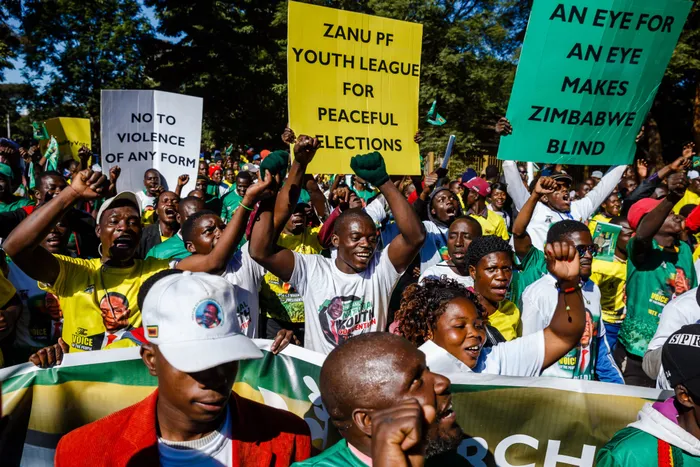Zimbabwe: Poll legitimacy a litmus test towards shaping the future

File picture: Activists from Zimbabwe’s ruling party Zimbabwe African National Union Patriotic Front (ZANU PF) Youth League march for peace ahead of the July 30 general elections on June 6, 2018, in Harare, Zimbabwe.
By Dr Sizo Nkala
Zimbabwe is set to hold its harmonised elections on August 23, as announced by President Emmerson Mnangagwa a few weeks ago.
The country’s 6.4 million registered voters will elect the next president, 270 members of the National Assembly (parliament’s lower house), and 80 members of the Senate (the upper house) and 1 970 local council members. While 210 seats in the National Assembly will be voted for directly in the country’s 210 constituencies, 60 seats reserved for women will be filled through proportional representation. The Senate is also elected indirectly through proportional representation.
The leading presidential candidates include Mnangagwa, who is running on the ruling party, Zanu-PF, ticket, Nelson Chamisa of the Citizens Coalition for Change (CCC) and independent candidate former minister of local government Saviour Kasukuwere, who served in the late former president Robert Mugabe’s cabinet.
There are eleven presidential candidates in total. The entry of Kasukuwere in the race has triggered talks of a possible presidential run-off should any of the candidates fail to win an absolute majority of the vote in the first round. The parliamentary and local government elections are likely to be a two-horse race between the ruling Zanu-PF and main opposition CCC who have managed to field candidates in every parliamentary constituency.
The CCC is a splinter of the Movement for Democratic Change Alliance (MDC-A) that was formed in January 2022. It won 19 out 28 parliamentary by-elections in March 2022, thus securing 19 seats in parliament. It is expected to increase its tally in the upcoming elections and substantially reduce Zanu-PF’s majority of 181 seats.
While Zanu-PF fielded candidates in all the wards for the local government, the CCC failed to field candidates in about 70 local wards, leading to Zanu-PF candidates being elected unopposed.
These elections are yet another test of Zimbabwe’s democracy. However, this election season seems to have already failed the test in one fundamental regard. The Zimbabwe Electoral Commission (ZEC) required aspiring presidential candidates to pay a candidate fee of $20 000 (about R375 000), a manifold increase from $1 000 in 2018, while aspiring MPs were asked to pay $1 000, up from $50 in 2018. This means that a party would need to raise about $230 000 to field candidates in the country’s 210 parliamentary constituencies and a presidential candidate.
As such, small parties with limited financial resources were forced to register candidates in a few constituencies. Potential independent presidential and parliamentary candidates may have been repelled by ZEC’s exorbitant asking price. In a country with a GDP per capita of just over $1 300, the fees demanded by ZEC were beyond the reach of many, thus making elections an affair of the affluent. Zimbabwe’s Electoral Act leaves the nomination fee for parliamentary and presidential candidates at the discretion of the ZEC.
The readiness of the ZEC to run and oversee the fast-approaching elections has become a cause for concern. First it was its management of the delimitation report which confirms constituency boundaries to be used for the elections. The body’s commissioners were divided over the integrity of the report, with seven out of the ZEC’s nine commissioners declaring that the report was flawed. One of the opposition parties, the Movement for Democratic Change-Tsvangirai (MDC-T) led by Douglas Mwonzora sought and failed to have the Constitutional Court delay the elections because of what it called an “illegal” delimitation report.
Another cause for concern is the quality and integrity of the voters roll. Many Zimbabweans could not find their names on the voters roll, while others had their names moved to polling stations they did not register in during the voters roll inspection exercise in May. Moreover, the opposition parties have been denied access to the voters roll. Under Zimbabwe’s Electoral Act, the ZEC is obliged to release voters' roll at the request of nominated candidates within a reasonable time after the nomination process has been concluded. The voters roll shows the list and number of voters in each polling station and constituency, which allows the candidates to design their campaigns accordingly and also compare the results released by ZEC against the roll. However, Zanu-PF has apparently been granted access to the voters roll, as evidenced by its ability to send messages to registered voters’ phones.
Zimbabwe has been known for holding disputed elections marred by violence, vote-rigging and reservations over the integrity of the election process. The outcome of the 2018 presidential elections was challenged by the opposition in the Constitutional Court on allegations of vote-rigging against the ZEC. About six opposition supporters were shot and killed by the security forces in August 2018 when they took their displeasure at the ZEC’s slow processing of the results to the streets.
By all indications, the upcoming elections will not be any different. Already, the conduct of the ZEC, the body charged with the administration of the elections, has been deemed unsatisfactory by most of the opposition political parties, especially with regard to how it is handling the voters roll issue. The last thing Zimbabwe and the region need is another disputed election and a government whose domestic legitimacy is questionable.
*Dr Sizo Nkala is A Research Fellow at the University of Johannesburg’s Centre for Africa-China Studies